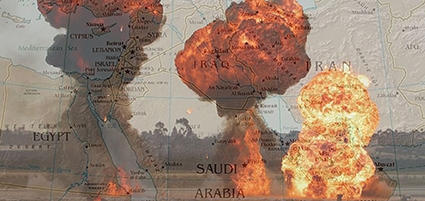Spotlight on the Greater Middle East, Turkey & the South Caucasus
The Middle East, or as it is often named, the “Levant,” is a transcontinental region at the center of western Asia and Egypt. Significant bodies of waters, such as Persian Gulf, Suez Canal, Black Sea, the Indian Ocean, and the Tigris and Euphrates rivers, have historically been used as waterways for international powers. The Suez Canal and Red Sea connect the Mediterranean and European ports with Asian markets. The Arabian Sea, particularly the port of Gwadar in Southern Pakistan, will be critical for China's ascendance, and the potential shift of geopolitical power from the West to the East. The region is also named the Fertile Crescent for its geographical shape.
Countries involved in the rivalries aim to gain upper hand advantages in the region by filling the vacuum after political crises leave a chasm. The US tried to deviate the region from Russia, while Russia considered it to be a peripheral region that needs to be taken care of. Russian relations with Egypt, Iraq, Tunisia and Algeria predate the collapse of the Soviet Union and since, Russia has constructed its presence by pouring Rubles into those states where leaders with an autocratic profile are most cordial.
These two superpowers gained a strategic position through “proxy alliances or partners”, more accurately, the US made it easier to implement its policy in the Greater Middle East, made affordable and effective with the help of Turkey, Saudi Arabia, Qatar, and Israel, among others- countries which collaborate with the US in several ways, from offering military bases, to providing logistics and facilitating diplomacy.
Today, Russia blames the US for instability and harboring extremism in the Greater Middle East. Having reshaped its foreign policy, Russia seeks and pursues the opportunity to demonstrate its ability as a power broker in countries, or between countries, where US interventions have come into question since the Obama Administration.
Russia collaborates with Iran, Egypt, and Turkey to carry out the grand plan to be a major competitor and an alternative power and broker. Russia also benefits from having relations with Turkey. Interestingly, Turkey is no longer a reliable partner for the United States as it slides toward Russia. With Russia seeming to be prolonging regional conflicts, Turkey could be more helpful if it allies with the United States. The case of Turkey in the region is more inextricably intertwined in different directions; as Turkey adopts different perspectives on the region from those of the US, especially with regards to arming and supporting the YPD, a Kurdish fraction Turkey sees as a terrorist organization but which the US believes is fighting effectively against ISIS. The US has to reconsider reliable alliances in Greater Middle East. In a nutshell, the competing Russia and United States are watching Turkey carefully. To the minds of many experts, Turkey is becoming autocratic, which is why it is quickly sliding towards the Russian orbit.
Current Qatar Crisis implication on the South Caucasus
If it is necessary to reframe the Qatar crisis and its implications on the South Caucasus, it can be considered economically consequential and it is speculated that the negative effects of the row between Qatar and Saudi Arabia and its allies may spill over into Turkey and Iran.
Many states in the Middle East have announced plans to cut diplomatic, bilateral and regional relations with the tiny peninsular state, allegedly due to their supporting terrorist groups. Qatar has so far denied accusations that it has been backing terrorism.
In an attempt to mitigate the loss of regional interest, Qatar has boosted Qatar Airways, initiated military improvements, and doubled down on economic relations with friendly states. Turkey and Iran have, in turn, acted against the blockade led by Saudi Arabia. Turkey gave full assistance towards Qatar, mainly through food deliveries and increasing military presence there. Turkey does not believe that Doha backs terrorism.
“Turkey is with Qatar in full support and the allegations are inhumane and un-Islamic,” President Erdogan said.
Turkey approved the fast track and passed a parliamentary bill to deploy Turkish soldiers on Qatari soil. The bill raised the question that with one of the largest US States military bases of the Middle East already located in Qatar, who is Turkey to protect Qatar from?
The wealthy Middle East states mainly invest in solar energy, tourism, property, hotels, and other investments in the South Caucasus. Qatar enjoys economic relations with three South Caucasus countries: Armenia, Azerbaijan and Georgia. In Georgia, Qatar and the United Arab Emirates have investments and additional economic interests. The UAE poured $155 million into the Port of Poti project with the 2008 deal, and has invested $140 million in hotels in Tbilisi. UAE, Qatar and Saudi Arabia also have economic and diplomatic relations in Armenia, Azerbaijan and Georgia. Saudi Arabia has deepened its ties in Azerbaijan, while the UAE has done so in Armenia. One of the most lucrative economic aspects is airways: Qatar Airways is one of the frequent airways serving the three countries alongside other airways from Middle East states. In return, the three South Caucasus countries have eased visa regimes and foreign investment taxation, opening business regulations and requirements with the Middle East.
Qatar and other countries will continue pursuing investments and ties in the South Caucasus for mutual and multilateral benefits but the relations may be interrupted if Russian and American geopolitical strategies on Turkey and Iran take another course.
Melik Alkan












